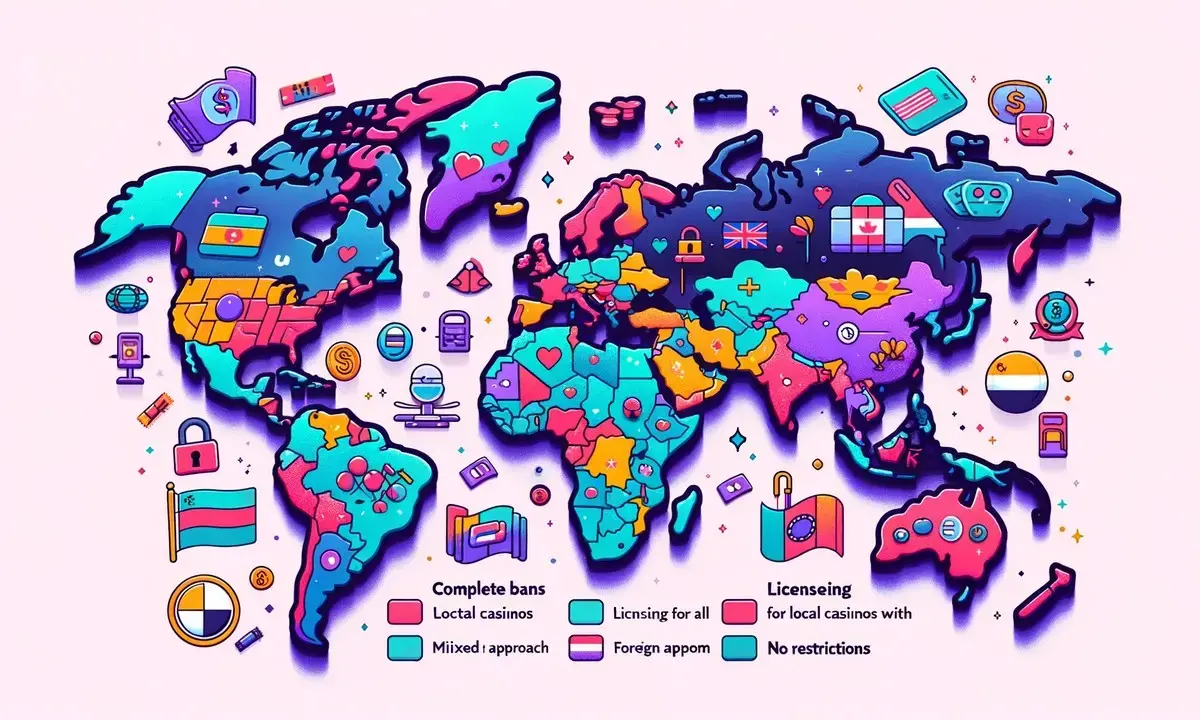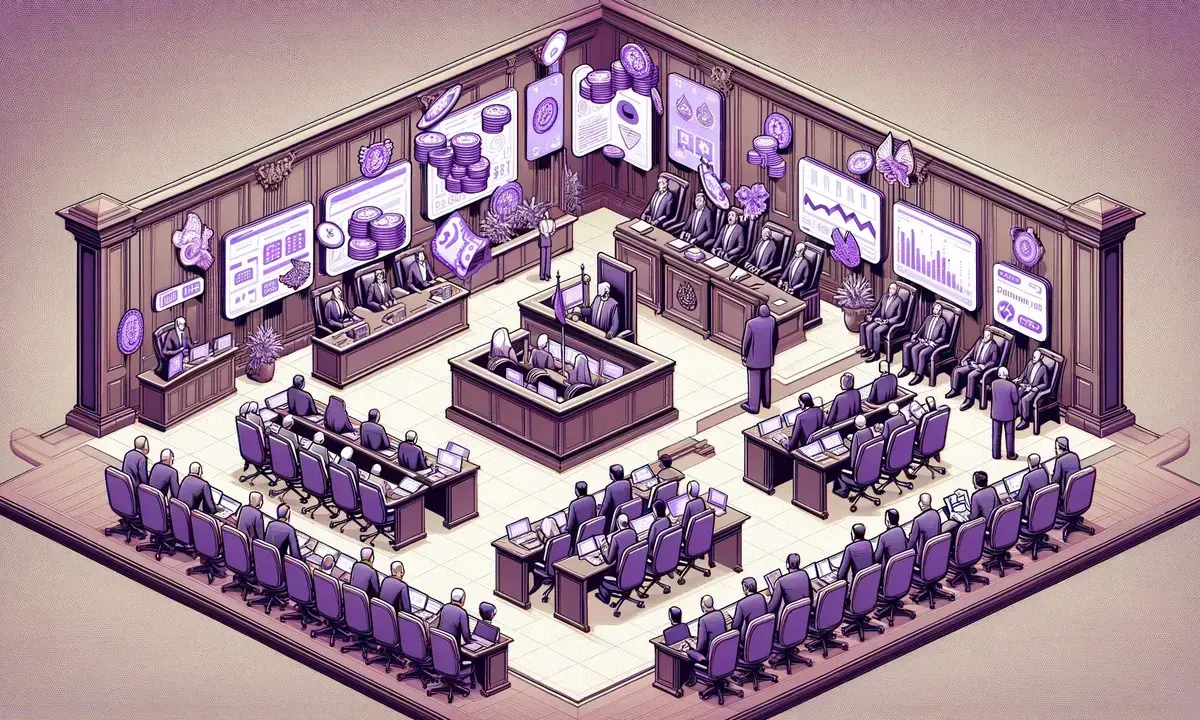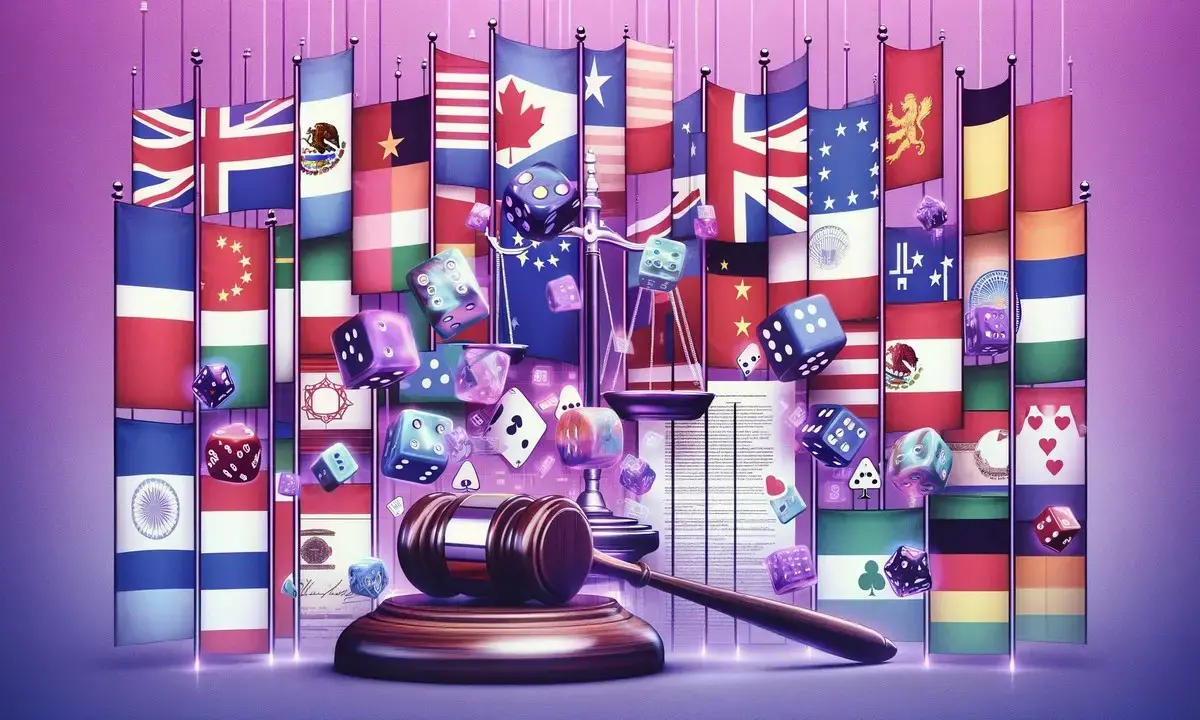Online gambling has undoubtedly become one of the most dynamically developing sectors of internet business in recent years. However, the attitude towards online casinos in the global community has split: some countries view it with suspicion and caution, seeing it as a potential threat to social stability, while other states perceive online casinos as an opportunity to replenish their budgets.
Let’s recall our geography lessons and look at the map through the prism of online gambling regulation policy.
Options for regulating online gambling
Indeed, the topic is really interesting – the geography here is diverse. That’s because the approach to regulating online gambling varies greatly. We will try to highlight a few conditionally common models. Each of them differs in the degree of restrictions and requirements for online casino operators from governments.
When online casinos are unrestricted
A paradise for players and owners of crypto casinos. In such countries, online gambling is allowed without any specific permissions for operators and players. At the time of writing this article, in [year] there were more than 40 such countries. Here are some of the countries familiar to you:
Andorra Benin Grenada Ireland
Liechtenstein Luxembourg Monaco
Mongolia Salvador CAR Jamaica
Plus small islands and a dozen African countries. It’s worth noting that government regulation in the above countries is fluid, and laws change quickly. Therefore, the list is subject to constant changes. Sorry about that.
Mixed system of restrictions
This refers to cases where a license is required for local online casinos, but not for foreign ones. And vice versa. Some countries require local operators to obtain a license but do not regulate foreign online casinos, which gives work to the local prosecution and lawyers.
Of course, this creates some disproportion in the market, where local companies are subject to strict control, while their foreign competitors can operate more freely. An example is Canada, where local provincial governments can license online casinos, but access to foreign sites is not blocked.
Mandatory licensing
For those who value the letter of the law. A clear and most common model in global practice. It implies that both local and foreign operators must obtain a license to operate in the country. A few illustrative examples:
UK Germany Denmark
Malta Armenia Austria
Mexico Romania Belgium
It is considered that this approach provides equal conditions for all market participants and allows governments to more effectively control the sphere of online gambling. The logic here is clear.
Complete ban on online casinos
In some countries, online gambling is completely prohibited, and access to online casinos is blocked at the state level. Chaos, frenzy, as well as administrative and criminal penalties. Such strict measures are usually motivated by the desire to protect citizens from gambling addiction and to comply with AML policy.
AML (Anti-Money Laundering) – is a set of measures aimed at preventing the use of a country’s financial system for the legalization of proceeds obtained through criminal means.
Here are a few quite strict countries towards online gambling. The list is made randomly, as organizing a “hit parade” is difficult – it would require comprehensive research.
Russia China Australia Brazil
Cyprus Iceland Indonesia Israel
Japan Kazakhstan North Korea S. Korea
If we continue this wonderful list, many Middle Eastern states would be included, possibly related to the cultural peculiarities of the region.
It’s worth adding that this specifically refers to online casinos. In some countries, online casinos are banned, but betting or card games are allowed.
Moreover, some regions, states, or provinces may have specific laws different from neighboring territorial units ( USA, India, Argentina). It’s all complicated there, and we won’t burden you with excess info. Although Argentina looks attractive for starting in online gambling, as it is rapidly moving towards the legitimization of cryptocurrencies.
License for Online Casinos
The word has been mentioned more than once, now let’s delve deeper. A license for online casinos is an official permission issued by a regulatory body that allows a company to legally offer gambling services on the internet. There are two types:
- International licenses. Issued by regulatory bodies such as the Malta Gaming Authority (MGA), Gibraltar Regulatory Authority (GRA), Curacao eGaming, etc. These licenses allow operators to offer their services in many countries around the world, except those requiring a national license.
- National licenses. Issued at the level of individual countries. Notable mentions include licenses from the UK Gambling Commission (UKGC) in the United Kingdom or the Swedish Gambling Authority (SGA) in Sweden. These permits require stricter compliance with local laws and regulations.
In the United Kingdom, the fee is from €4,000 for an application and the same amount for an annual fee depending on the gambling activity and profit. The gambling license in the Swedish SGA is from €40,000. For 5 years. In reality, the figures are higher, as there are other contributions, taxes, and fees involved in opening an online gambling business.
If you plan to register an online casino in Malta, and your cryptocurrency wallet is squeezed by rapidly appreciating Bitcoins, we recommend using our TOP cryptocurrency exchanges. There we collect verified exchange services with the best currency rates.
Taxes for Online Casinos
The costs of a license can be one-time, but taxes must always be paid. Tax rates for online casinos vary greatly by country and can range from 1% to 30% of income, depending on regulatory legislation.
In Malta, for example, the tax rate for online gambling operators ranges from 0.5% to 5% of gross gaming revenue, depending on the type of license.
In the United Kingdom, the tax rate on remote gambling games is 21% of GGY.
GGY (Gross Gambling Yield) is the gross profit from gambling, i.e., the amount of stakes made by players, minus the winnings paid out to players.
For example, in 2020, the total revenue from the remote gambling sector in Britain was more than £5.7 billion. For comparison, with this money, one could build another skyscraper “Burj Khalifa”, the headquarters of Apple, and buy a small island in the Caribbean Sea with the change.
How bonuses in gambling are accounted for in GGY is a big secret and the talent of the organizers. We recommend familiarizing yourself with our list of the most advantageous bonus offers from online casinos, to at least increase your chances of winning.
Offshore Zones for Registering Online Casinos
Speaking of islands. Offshore zones are often chosen for registration due to relatively low tax rates, more lenient regulation, and a simplified licensing process. However, the cost of registration, as well as the share of taxes from online casinos to the state budget, can vary greatly depending on the jurisdiction.
Malta is one of the most popular jurisdictions for online gambling thanks to its transparent regulation and tax policy. The talk here is about a total of €36,000 (licensing fee, initial application fee, contributions for system audit and compliance audit).
Curacao offers one of the most economical and fastest options for obtaining a license for online gambling. The annual fee for a license starts from €62,000.
Interesting fact. To obtain (and not lose) a gambling license in Curacao, at the place of registration, i.e., on the island, there must be at least one business manager and at least three local employees.
Gibraltar. The British overseas territory offers attractive conditions for online gambling with a license for 5 years for €100,000.
Isle of Man. Another possession of the British Crown. Also popular among online casino operators. Though not a cheap option. The first fee for considering an application is €5,000, and €40,000 for the main license. As everywhere, there are other forms and options for licensing.
Conclusion
Well, it’s time to draw conclusions. We suggest agreeing with the author of the novel about Gulliver’s travels, who is credited with the words: “Nothing in the world is more constant than change.”
Governments around the world today approach the regulation of this dynamic industry differently. Their goal is beyond the horizon of events – to find a balance between opportunities for economic growth and the necessity to protect their citizens from potential risks. Everything changes quickly, and we just have to adapt to new conditions.
And if the manager of your company is currently in Curacao – let them write in the comments what the weather is like there.



